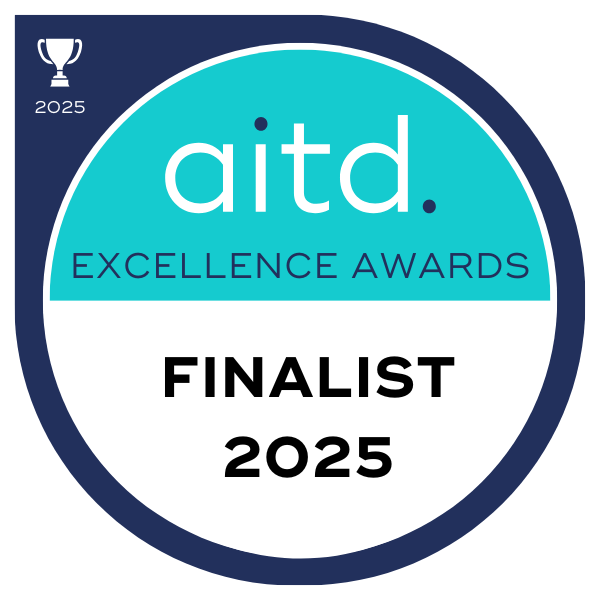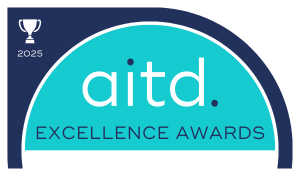By the APS Academy
Two APS Academy programs have been shortlisted for an Australian Institute of Training & Development Excellence (AITD) Award. These are for the APS Graduate Development Program in the category of Best Use of Technology for Learning and for the Pacific Engagement Microcredential in the category of Best Blended Learning Solution.

What are these Australian public service (APS) programs and why have they been considered noteworthy for an AITD award?
The AITD Excellence Awards acknowledge and celebrate excellence in learning design at a national level. The Awards are an important industry acknowledgement of standards and professionalism, and provide many opportunities for winners and finalists to showcase their work and build their organisational reputation across Australia.
These two programs represent the APS Academy’s forward-thinking and innovative approach to APS capability development. The APS Graduate Development Program has transformed itself from a traditional face-to-face format to a blended, predominantly digital model, ensuring access and connection to the APS’ geographically dispersed workforce. Meanwhile, the microcredential program is a standout example of co-design in action, partnering with academia, Pasifika specialists and APS practitioners to embed industry-relevant learning directly into the education system.
Award winners will be announced on May 22, 2025.
Let’s take a closer look
APS Graduate Development Program - in the category of Best Use of Technology for
The APS Graduate Development Program was redesigned and this aligns with the APS Academy’s mission to build a highly capable, future-ready public service through continuous learning and capability development. The program is anchored in three key themes that guide the APS Academy’s capability development work:
- APS Craft - focusing specifically on what is particular about excellence in the public service, characterised in 6 craft domains: integrity; working in government; policy; implementation and services; partnerships and engagement; and leadership. The learning content of the APS Graduate Development Program is based on what is required as a core set of knowledge and skills for new starters in the APS.
- Practitioner-Led Learning - By harnessing the expertise of APS practitioners, the program integrates real-world wisdom with state-of-the-art learning design. This approach fosters continuous learning through coaching, mentoring, peer collaboration, and formal learning opportunities, ensuring that knowledge is both practical and current.
- Networked Approach - To deliver at scale, the program connects with centres of excellence and graduate coordinators across the APS. This networked model promotes system-wide capability alignment while allowing flexibility to meet the diverse needs of different agencies and contexts, ensuring relevance and impact across the public service.
In addition, the program aims to establish a practice of continuous learning in the earliest stages of the graduate’s career and a mindset of a one-APS approach to problem solving from the outset.
The delivery of the reimagined APS Graduate Development Program reflected a commitment to innovation and excellence in workplace learning. The 2024 program cohort included 307 graduates from 25 agencies, representing a 128% increase in participation compared to the last face-to-face program in 2019. The transition to a blended model allowed the program to scale effectively while increasing both the quality and depth of learning.
Throughout the program, graduates engaged in a series of interactive learning sprints designed to cover essential APS competencies. The combination of structured asynchronous learning, facilitated live sessions, and a range of social learning activities, discussions, peer pods (small teams) and larger cohort group activities of 40 to 50 learners, that created a rich learning environment that encouraged both individual reflection and collective problem-solving. The program’s dedicated learning platform recorded over 25,000 learner interactions, demonstrating high levels of engagement and active participation.
One of the standout aspects of delivery was the integration of individual coaching. Each graduate had access to three personalised coaching sessions with accredited APS coaches, providing targeted career development support. These sessions allowed participants to discuss and embed their learning experiences, receive guidance on applying their knowledge to their roles, and refine their professional development plans.
To find out more on this program and to enrol for new graduates, contact the team.
Pacific Engagement Microcredential - in the category of Best Blended Learning Solution
The APS Academy has partnered with highly esteemed universities, to develop a number of groundbreaking microcredentials, one of which was the Pacific Engagement microcredential. They are designed by leading APS practitioners and academics, with the programs providing high-quality learning tailored to the demands of the APS workforce.
The Pacific Engagement: Building long-term relationships through cultural capability microcredential is worthy of being a finalist due to the extensive testing that was done through a pilot program at its inception. This postgraduate-level microcredential available through Flinders University was designed for public servants engaging with the Pacific region.
The co-designed program offers 48 hours of online and in-person learning to deepen understanding of Pacific cultures, societies, and economies. It integrates academic, Pasifika, and public service perspectives through engaging and experiential synchronous and asynchronous learning.
The program puts Pasifika knowledge and perspectives at the heart of the learning experience. Participants learn about the Pacific through a range of online resources including videos, interactive discussions, scenario-based learning and assessment. The program challenges participants to reflect on their own cultural values, practices and ways of communicating by learning through Pasifika methodologies. Through this reflective practice, participants gain knowledge and insights that enable them to develop their own cultural capability toolkit, equipping them with practical strategies for effective engagement.
The result has been is a program that is academically rigorous, highly engaging and of great practical benefit to participants. Additionally, as a university-accredited microcredential, it offers pathways into postgraduate degree programs, providing participants with opportunities for further study.
Following a successful pilot in 2024, the program is now available across the public sector, with a target audience of 14,000 staff. Selected resources developed under the program are being made more widely available to public sector employees at no cost, improving accessibility and return-on-investment.




